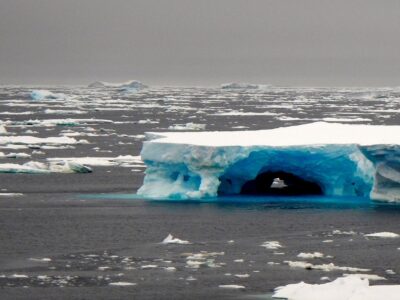
Updated Aug. 3, 2015.
Sea level rise from melting ice sheets in Antarctica and Greenland threatens catastrophe for coastal cities within decades unless strong measures are taken to reduce CO2 emissions from the use of fossil fuels, argues climate scientist James Hansen.
Hansen’s warnings about the dangers of climate change are not new, but a new paper written by him and 16 other scientists offers some new lines of inquiry on the subject. They studied and modeled climate evidence from the Eemian period—modeling climate changes going on about 120,000 years ago during the last interglacial period, when temperatures were warmer than today. They conclude that the warming going on today risks setting off “feedbacks” in the climate system—changes in ocean circulation and the speed at which ice sheets may collapse—that portend irreversible changes, including rapid sea level rise and more severe storms.
The paper argues that sea level could surge 10 feet within 50 to 100 years. That is beyond the predictions expressed in the last report of the Intergovernmental Panel on Climate Change. And, Hansen says, the stated goal of limiting global warming to 2 degrees C above pre-industrial levels is not enough to stop it. Hansen is an adjunct professor at The Earth Institute and director of the Program on Climate Science, Awareness and Solutions.
Hansen told reporters in a conference call Monday that the paper was based on studies of paleoclimate, model simulations and observations on what’s going on today.
The catch is that the paper has yet to be peer-reviewed; it was posted online July 23 as a “discussion paper” by the journal Atmospheric Chemistry and Physics, with the intention of prompting that review at the same time the public has a chance to see it.
Hansen spoke about the findings in a press conference and on the call with reporters Monday—three days before the paper was actually released online. This is unusual: scientific findings are more typically reviewed by other scientists before publication, and the public reporting holds off until that happens. Reporters in the conference call questioned how the paper should be received under these circumstances. Hansen replied that the paper will be reviewed, and should be judged by the science and not his reputation as a strong advocate for policy responses to climate change.
Climate reporter Andrew Revkin does a good job parsing the issue in a blog post published Thursday, with comments from some other climate scientists. There are other reports on the paper, some with comments from other scientists, some without, around the media.
Two to check out:
The Washington Post
You can read the paper at Atmospheric Chemistry and Physics Discussions
(pdf).
Hansen wrote his own summary of his findings that’s up on the Huffington Post, here.



